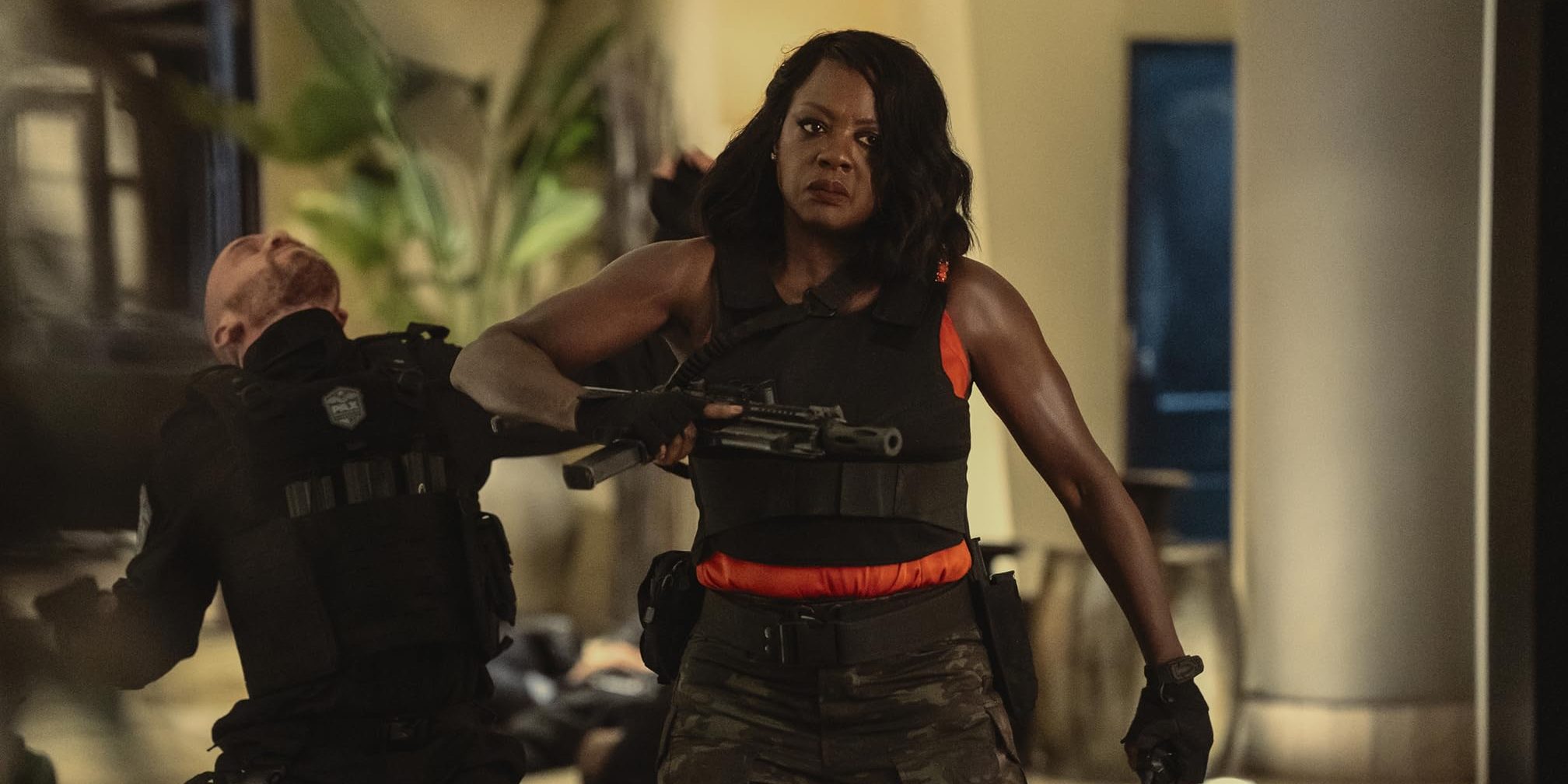Directed by Patricia Riggen, Prime Video’s ‘G20’ wraps up with a high-octane blend of action and emotional intensity. At the center of this politically charged thriller is President Danielle Sutton, who, alongside her daughter Serena, survives a harrowing terrorist attack on the global summit. The film closes on a cathartic and satisfying note as both mother and daughter emerge alive—a seemingly straightforward resolution. However, beneath the surface lies a web of complex geopolitical themes and character dynamics that invite deeper reflection. The ending, in particular, warrants a closer exploration! SPOILERS AHEAD.
G20 Plot Synopsis
In ‘G20,’ Patricia Riggen thrusts viewers into a politically volatile and action-packed world, headlined by President Danielle Sutton of the United States—a formidable leader who’s as skilled in combat as she is in diplomacy. Sutton is preparing to attend the prestigious G20 summit, set to take place at the luxurious Grand Diamont Hotel in Cape Town, South Africa. The event is a high-stakes gathering of global leaders meant to address urgent financial and political issues. President Sutton is expected to unveil a groundbreaking proposal on digital currency—a plan that can reshape the global economic landscape. Despite her polished exterior and commanding presence, she shares a strained relationship with her daughter Serena, who accompanies her on this trip along with her husband Derek and son Demetrius.
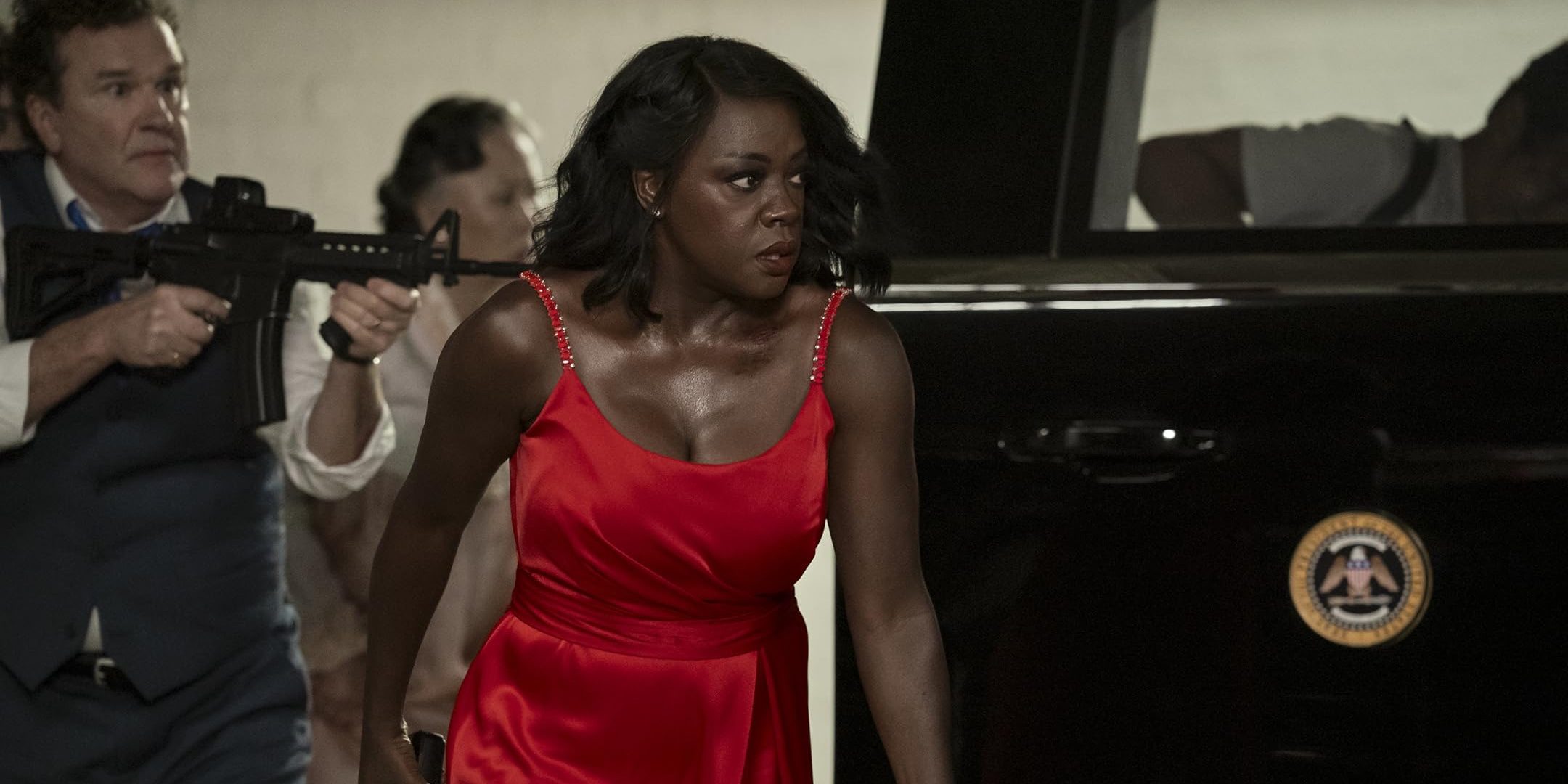
Serena approaches her mother’s role and emotional detachment with resentment, leading to a turbulent dynamic between them. However, personal conflicts are soon overshadowed by an international crisis. Just as the summit begins, chaos erupts. A highly organized terrorist group led by Edward Rutledge infiltrates the hotel. The attack is swift and brutal—internet access is jammed, communication is severed, and two world leaders—from Australia and South Korea—are eventually executed to send a chilling message to the rest of the world. Rutledge’s mission is deceptively modern: he forces the leaders to recite a strange code, “The quick beige fox jumped in the air over each thing dog. Look out, I shout, but he’s foiled you again,” which is a pangram then used to create deepfake AI voice replications.
As the world spirals into panic, President Sutton refuses to back down. Despite being physically and emotionally shaken, she channels her military training and political acumen to fight back. Along the way, Serena, who initially seems disinterested and aloof, rises to the occasion, proving to be a vital ally. Together, the mother and daughter confront Rutledge, whose vendetta against the POTUS adds a personal edge to his actions.
G20 Ending: Why Does Edward Rutledge Target the G20 Summit?
Edward Rutledge’s attack on the G20 summit is not just a calculated act of terrorism—it’s a deeply personal mission driven by betrayal, grief, and a warped sense of justice. A former operative in the Australian armed forces, he is introduced as a rogue agent who orchestrates a violent siege of one of the world’s most high-profile political forums. On the surface, his motive appears rooted in chaos and financial disruption, but as the film progresses, it becomes clear that his intentions are much more complex and personal. Rutledge positions himself as a revolutionary figure who is exposing global corruption. He and his team hijack the summit and cut off all external communication, manipulating the voices of world leaders through AI-generated deepfakes.
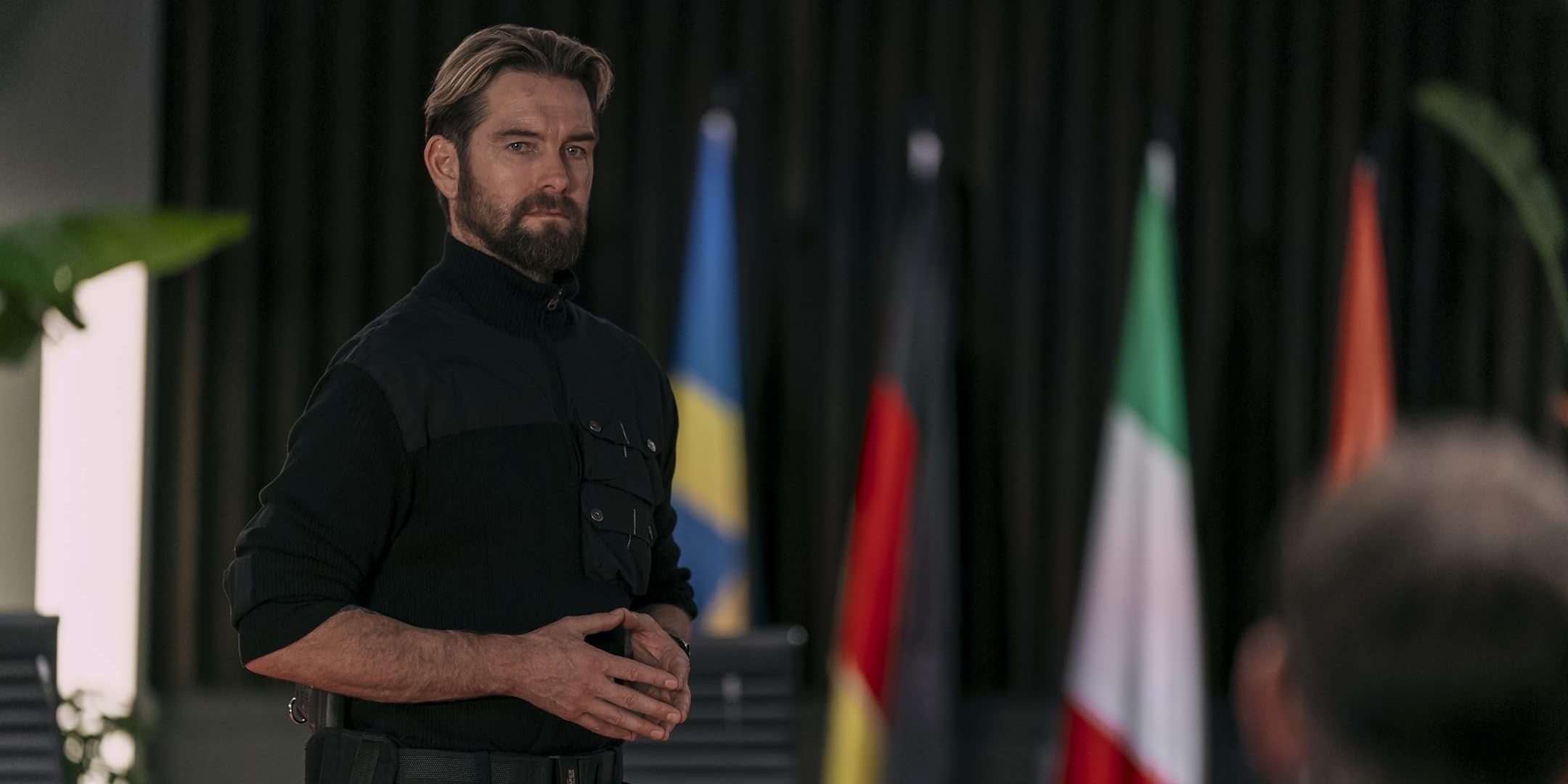
By forcing these leaders to recite a coded phrase, Rutledge creates synthetic speeches convincing global citizens to withdraw their savings and invest in cryptocurrency. His manipulation results in people from all over the world draining their bank accounts and investing everything in his preferred medium of exchange. The hackers, of course, intend to reroute these funds into their own accounts under the guise of a populist financial revolution. Rutledge presents it as a noble cause or an anti-establishment movement designed to awaken the world to financial manipulation and inequality, but it’s nothing more than a well-packaged theft fueled by digital warfare.
Furthermore, Rutledge’s true agenda is far more intimate: revenge against President Danielle Sutton. The terrorist’s vendetta stems from a shared history with the POTUS. He reveals that he was a witness to her rise to power, specifically referencing a covert operation that left two of his compatriots or “best mates” dead in a war zone. He believes Sutton’s decisions directly led to their deaths. To him, the US President represents the worst kind of leader—one who wears valor as a mask but is, in his eyes, a fraud who ascended to political glory on the backs of others’ sacrifices. “You’re fake. You’re a fraud,” he hisses at her during one of their confrontations, exposing the emotional wound that drives his violent campaign.
What makes Rutledge such a compelling antagonist is his duality—he’s not simply a terrorist motivated by greed or ideology but a broken man consumed by loss. He channels his pain into a twisted form of justice, believing the global stage of G20 is the perfect setting to both humiliate Sutton and dismantle the institutions he blames for his trauma. Rutledge’s attack on the G20 summit is, therefore, not just an act of terrorism but a tragic culmination of personal loss and ideological disillusionment. His character serves as a grim reminder of how the consequences of war can ripple into the political arena, where unresolved pain can masquerade as a cause.
Is Edward Rutledge Dead or Alive? What Happens to His Crypto Money?
Edward Rutledge’s confrontation with President Danielle Sutton ends with the former falling from the hotel where the G20 summit takes place. While the film does not explicitly show his body after his fall, the thriller leaves very little ambiguity about his fate. In the climactic action sequence, Rutledge takes Serena hostage and attempts to escape via a helicopter. President Sutton, in a desperate and intense face-off, retrieves his digital crypto wallet, the linchpin of his entire operation, and throws it into the air to distract him. The two end up clinging to the edge of the helicopter, and in the struggle, both lose their grip, but only Rutledge falls.
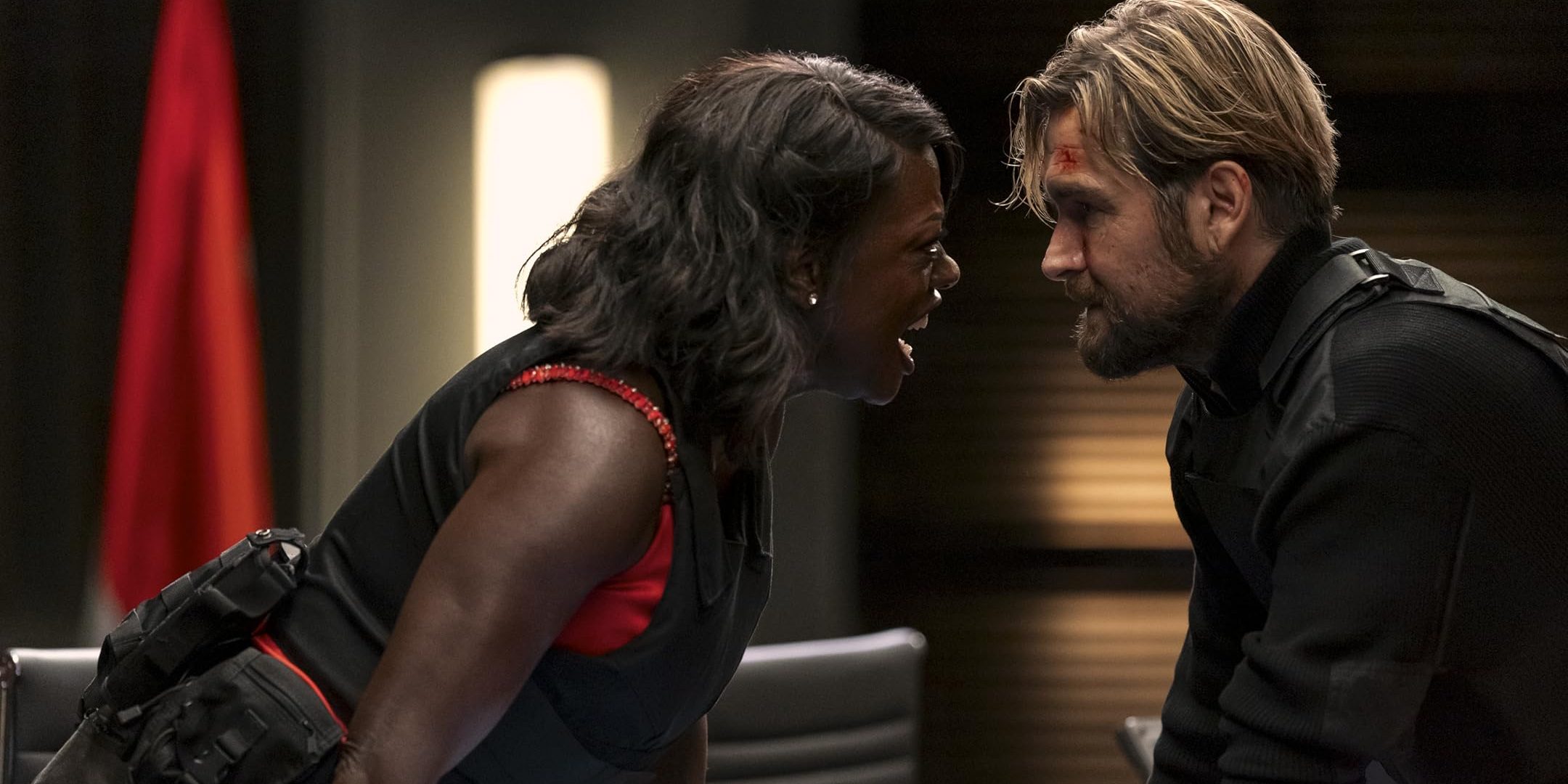
While the movie refrains from showing a graphic confirmation of his death, the implication is clear. The fall from such a height will certainly be fatal. But, even if we consider the unlikely event that he survives the impact, the consequences remain the same. Rutledge is a rogue ex-intelligence operative responsible for a terrorist attack that results in the deaths of world leaders and a mass-scale financial manipulation using deepfakes and AI tools. He is now the most wanted man on the planet. There will be no rescue, no trial—only immediate execution, especially considering the high-profile nature of his crimes and the number of powerful nations involved.
The lack of confirmation regarding Rutledge’s death, in this case, leans more toward cinematic style than any real ambiguity about his fate. In other words, he is gone. The terrorist’s failure is cemented not only by his fall but also by the loss of the very weapon he believed would reshape the world order. The digital crypto wallet he used to siphon global funds, an instrument of both ideological rebellion and personal gain, is taken by President Sutton during their fight. Without it, he cannot access the billions redirected from global bank accounts. More importantly, the wallet ends up in Sutton’s possession.
This is a pivotal turn. The same means Rutledge uses to spread chaos is now in the hands of the person he sought to destroy. His ambition to tear down corrupt institutions collapses, not with a speech or revolution, but with a punch and a fall. Now, the cryptocurrency will likely be returned to all the rightful owners who have mindlessly given away their money under the supervision of President Sutton. In the end, Rutledge’s death feels inevitable. His vision has been rooted in revenge, not renewal, and his plan, though intricate, has been built on manipulation and bloodshed.
Rutledge’s crypto fortune, the supposed tool of liberation, instead becomes the final symbol of his failure—reclaimed by the very system he tries to burn down. The film closes this arc with poetic justice. The terrorist falls, his dreams shattered mid-air, while President Sutton and her daughter rise, literally, in the helicopter, carrying with them both the scars and the strength to restore what has been nearly lost.
Why Do Joanna Worth and Agent Darden Betray President Danielle Sutton?
The betrayal of two of President Danielle Sutton’s most trusted associates—Agent Darden and Joanna Worth—is a turning point in ‘G20,’ not just for its shock value but for the way it reveals the ideological and personal fractures within the POTUS’ inner circle. Their betrayals aren’t arbitrary; they are rooted in years of resentment, unaddressed ambition, and political disillusionment, making them some of the film’s most layered and morally ambiguous characters. Agent Darden’s betrayal is the more ideologically charged of the two. Positioned early in the film as a loyal protector—even a savior figure to the President—he represents the face of loyalty and military precision.
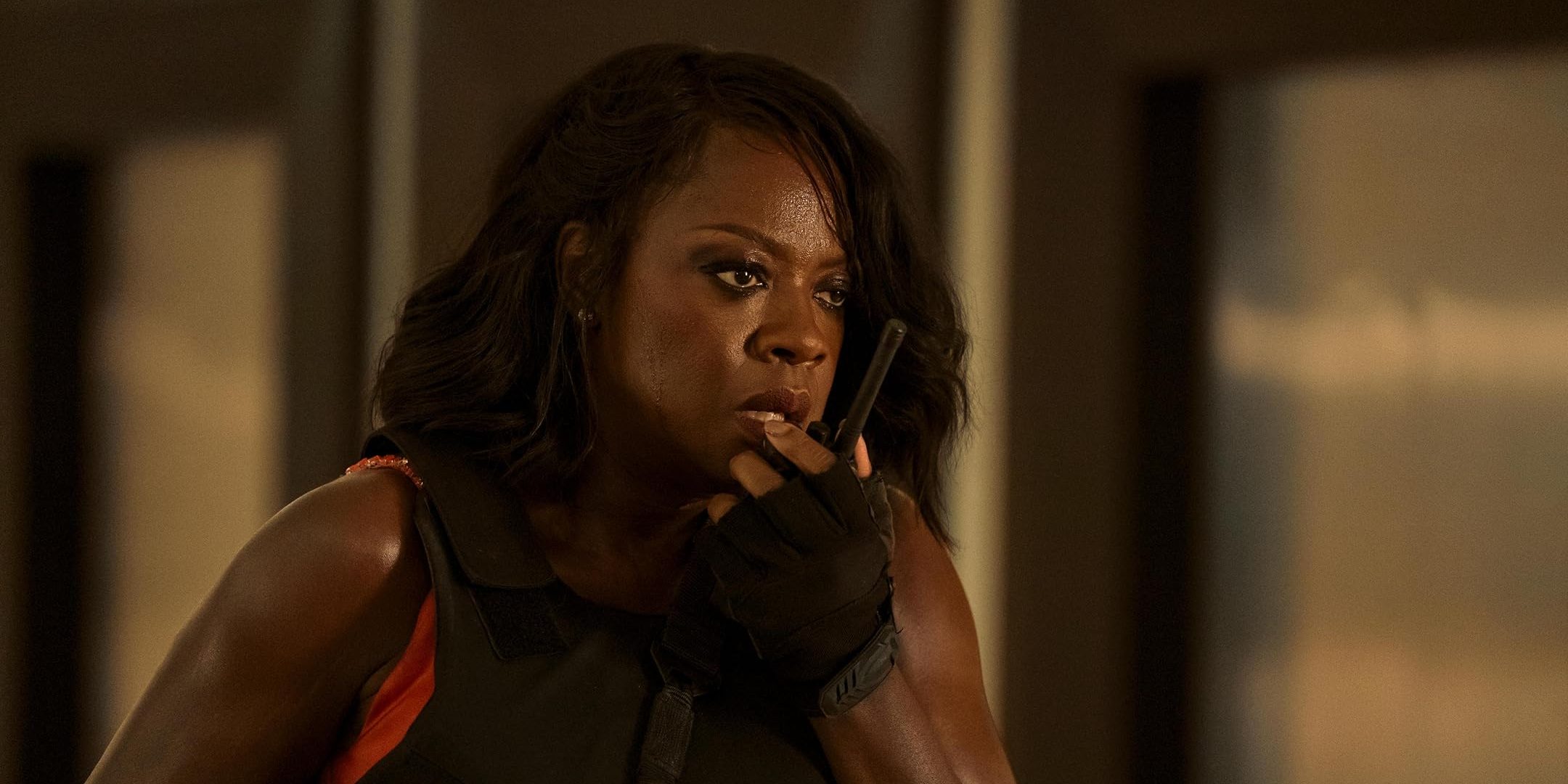
Darden’s actions are marked by discipline, and for much of the movie’s runtime, he remains above suspicion. But when President Sutton’s husband Derek uncovers his duplicity, the mask falls, and his true motivations emerge in a chilling declaration: “Your wife betrayed my country when she decided that farmers in Africa were more important than Americans.” Darden’s words lay bare his belief that Sutton’s globalist policies, especially those aiding developing nations, come at the cost of American security and welfare. He doesn’t just oppose her politics; he sees her as a traitor to the very nation she was elected to serve.
Darden’s betrayal is fueled by a twisted sense of patriotism—the idea that Sutton’s humanitarian vision compromises American interests. In many ways, the agent is a tragic character—a man who once believed in the system but grew embittered watching it drift from his values. He allies with Rutledge not out of greed but from conviction, believing the President’s ideology is more dangerous than terrorism. His death at the hands of Agent Manny Ruiz—his throat slit during a tense confrontation—serves as poetic justice.
Joanna’s betrayal, in contrast, is deeply personal and emotionally raw. Her confrontation with President Sutton near the end of the film is charged with bitterness and long-suppressed envy. After Sutton catches her hiding Rutledge’s crypto wallet, a damning piece of evidence, Joanna erupts: “How dare you judge me? You stole my destiny! I worked my entire life for the job you took. It was mine, and I was forced to sit and watch you walk into it. As if it belonged to you.” Her motivations stem from thwarted ambition. She believes that the presidency or at least a seat of real power should have been hers. In her eyes, Sutton’s success is not earned but bestowed, and that perceived injustice festers into betrayal.
Unlike Darden, whose ideology guides him, Joanna’s is a tale of career resentment. She becomes the “inside man,” aiding Rutledge not because she believes in his cause but because she wants to see Sutton fall from grace—to watch her lose what Joanna believes was never hers to begin with. The scene ends with a powerful moment as Sutton slaps the treasury secretary, not just in anger but as a symbolic rejection of the toxicity that personal ambition can breed in politics. The traitor doesn’t die; her punishment is to live with her failure, exposed and humiliated.
President Danielle Sutton and Serena Survive After Eliminating Edward Rutledge
President Danielle Sutton and her daughter Serena emerge from the chaos alive, their survival marking a triumphant conclusion to the whirlwind of political intrigue and high-octane action in ‘G20.’ After a brutal confrontation with Rutledge aboard a helicopter hanging dangerously over the Grand Diamont Hotel, the two are rescued in the nick of time. Military professionals, finally having regained control over the compromised premises, arrive just in time to pull the helicopter up and secure both Sutton and Serena. It’s a moment that showcases not just their physical resilience but their emotional strength—a mother and daughter who, despite personal rifts and extraordinary circumstances, manage to save each other and the world leaders under threat.
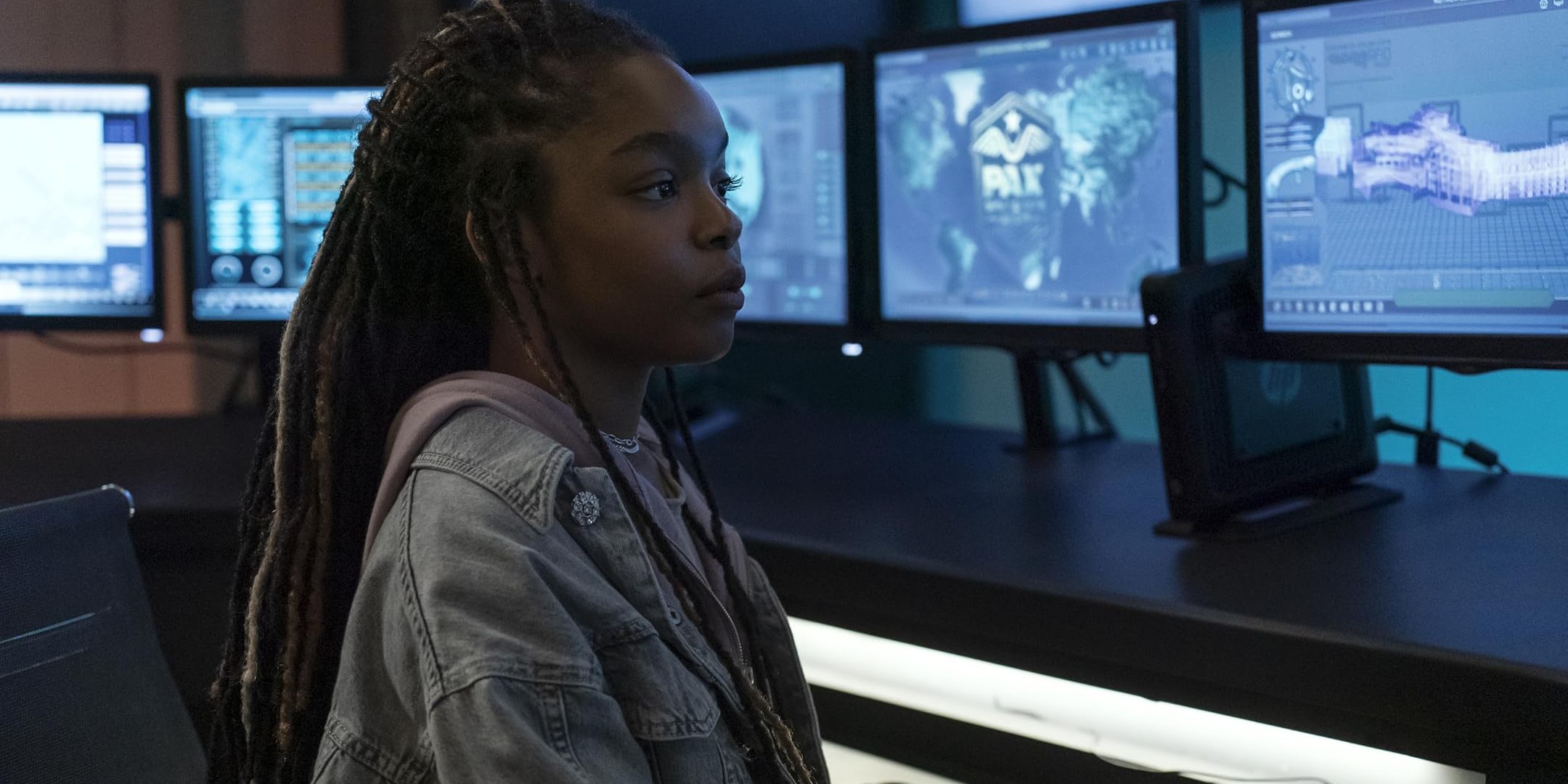
In the aftermath of the mayhem, order is gradually restored. The G20 summit, which gets brutally attacked by Rutledge’s terrorist siege, resumes under tight security. Despite the violence and the shocking betrayal by insiders, President Sutton refuses to let the event be defined by fear. The leaders reconvene, signaling a powerful message to the world: diplomacy and unity will not be held hostage by terror. Sutton’s loyal bodyguard, Manny Ruiz, who gets shot earlier in the film, is revealed to have survived. His return symbolizes not only the toll the events have taken on individuals, institutions, and trust but also of endurance and loyalty. His presence reinforces the idea that while the system may bend, it does not break.
Justice catches up with Joanna, and she is seen being led to prison. Her fate highlights how ambition without ethics leads to self-destruction. The film concludes with President Sutton signing the “Together Plan,” the digital currency accord that initially brings her to the summit. Her vision for a more transparent and stable global economy, threatened by Rutledge’s corruption-fueled manipulation of cryptocurrency, finally sees the light of day. It’s a quiet yet powerful moment, symbolizing hope, progress, and the restoration of international trust. As cameras flash and the world watches, Sutton stands firm with her entire family, which comprises Derek, Serena, and Demetrius, as a leader who has faced both personal and political reckonings and emerged not just unbroken but stronger.
Read More: The Assessment Ending Explained

